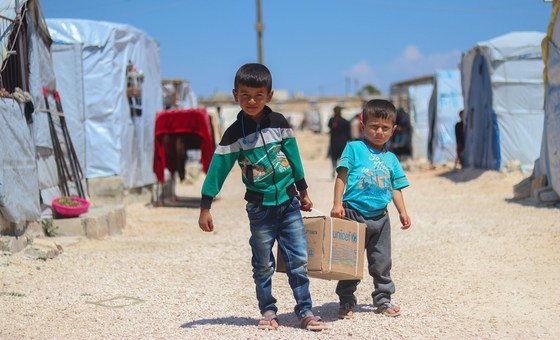Updated resolution 2533 will allow the delivery of food, medicine and other lifesaving assistance through the Bab al-Hawa Border Crossing.
Germany, cosponsor of the resolution, expressed relief over the extension.
“It is good news for millions of people in Syria that the Security Council was ultimately able to agree on our compromise proposal”, German Foreign Minister Heiko Maas said.

Along with co-penholders Germany and Belgium, voting in favour of the resolution were Estonia, France, Indonesia, Niger, St. Vincent and the Grenadines, South Africa, Tunisia, United Kingdom, United States and Vietnam.
Meanwhile, China, Dominican Republic and Russia abstained.
The previous authorization, under resolution 2504, for the six-year-long humanitarian operation expired at midnight yesterday, leaving millions of Syrian civilians in limbo.
Making compromises
In a statement issued shortly after the vote, Mr. Maas said that the negotiations were guided by “humanitarian considerations” and “the demands of aid workers on the ground”.
“Ultimately, we proposed a compromise to preserve the mechanism”, he said, while adding his belief that “more crossings are necessary”.
Safeguarding aid
Taking note of the Security Council’s decision, through his spokesperson, Secretary-General António Guterres said that the reauthorization would help safeguard assistance for “2.8 million people-in-need” in the northwest until July next year.
“Cross-border humanitarian assistance remains a lifeline for millions of people-in-need in the area and beyond”, he upheld.
The Secretary-General also reiterated his call on all parties to the conflict to “ensure humanitarian access to all people in need in accordance with international humanitarian law”.
Earlier veto
The Council’s penholders on the humanitarian aspects of the Syrian conflict, had initially put forward a largely similar draft that would have extended the so-called cross-border mechanism, for a full year.
But it was vetoed by China and the Russian Federation on Wednesday, with delegations accusing each other of politicizing the humanitarian assistance that more than 11 million Syrians depend upon.
A competing draft resolution from the Russian Federation that would have authorized deliveries only through Bab al-Hawa until 10 January 2021, then failed to be adopted on Thursday as it lacked the required number of votes.
The result was four in favour (China, Russian Federation, South Africa, Viet Nam) to seven against (Belgium, Dominican Republic, Estonia, France, Germany, United Kingdom, United States), with four abstentions (Indonesia, Niger, Saint Vincent and the Grenadines, Tunisia).
Bab al-Salam is the humanitarian gateway to northern Aleppo while Bab al-Hawa serves Idlib.
More deliveries needed
In his latest report to the Council on the implementation of the cross-border mechanism, UN Secretary-General António Guterres said that the deliveries through Bab al-Salam and Bab al-Hawa are not only operating at record levels, but must be further scaled up in response to the COVID-19 pandemic.
He recommended that authorization for both crossing points be extended for an additional 12 months, adding that a failure to renew would severe a lifeline from millions whom the United Nations cannot reach by other means.

